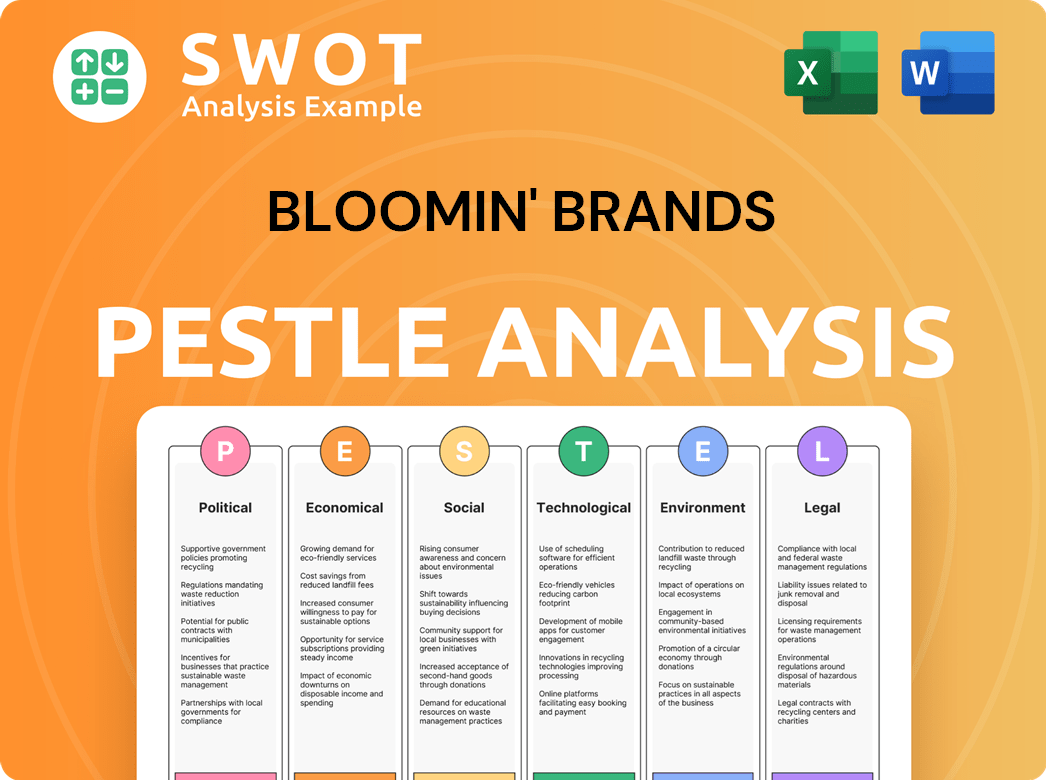Bloomin' Brands Bundle
What's the Story Behind Bloomin' Brands?
Ever wondered how a single restaurant concept blossomed into a global dining empire? Bloomin' Brands, the force behind beloved chains like Outback Steakhouse, boasts a compelling story of innovation and strategic growth. From its humble beginnings in Florida, the company has navigated the competitive restaurant industry to achieve remarkable success. Let's uncover the Bloomin' Brands SWOT Analysis and explore the key moments that shaped this culinary giant.

The brief history of Bloomin' Brands company reveals a fascinating journey of expansion and adaptation. Founded in 1988, the company, initially centered around Outback Steakhouse, quickly expanded its brand portfolio to include Carrabba's Italian Grill, Bonefish Grill, and Fleming's Prime Steakhouse & Wine Bar. Understanding the Bloomin' Brands history timeline is crucial for investors and strategists alike, offering insights into its market share and strategic decisions.
What is the Bloomin' Brands Founding Story?
The story of Bloomin' Brands, a multi-concept restaurant company, began on August 10, 1988. The founders, Chris T. Sullivan, Robert D. Basham, and Timothy Gannon, brought a wealth of restaurant industry experience to the table. Their vision was to create a unique dining experience that would set them apart in a competitive market.
The trio identified a gap for a casual dining steakhouse with a distinct theme and accessible price point. This led to the creation of Outback Steakhouse, the company's flagship brand. The initial focus was on providing high-quality food and a welcoming atmosphere.
The first Outback Steakhouse opened in Tampa, Florida. The founders' initial funding came from personal savings and support from friends and family. Their hands-on approach and deep understanding of the restaurant business were critical to their early success. Learn more about the Owners & Shareholders of Bloomin' Brands.
Bloomin' Brands' founding was a result of the combined experience of its founders, who saw an opportunity to create a unique dining experience. The company's initial success was built on a hands-on approach and a focus on quality.
- Bloomin' Brands was founded on August 10, 1988.
- The founders were Chris T. Sullivan, Robert D. Basham, and Timothy Gannon.
- The first Outback Steakhouse opened in Tampa, Florida.
- Initial funding came from personal savings and loans.
Bloomin' Brands SWOT Analysis
- Complete SWOT Breakdown
- Fully Customizable
- Editable in Excel & Word
- Professional Formatting
- Investor-Ready Format

What Drove the Early Growth of Bloomin' Brands?
The early growth of Bloomin' Brands, initially fueled by Outback Steakhouse, was marked by rapid expansion and strategic acquisitions. Following the opening of its first location in Tampa, Florida, in 1988, the company quickly replicated its successful model. The appeal of its Australian theme and consistent quality led to strong customer reception, driving early growth. By 1990, Outback Steakhouse had expanded to multiple locations across Florida.
The early 1990s were a period of significant expansion for the Bloomin' Brands company, with growth extending beyond Florida through company-owned restaurants and franchise agreements. The first major expansion outside Florida occurred in 1991, with new restaurants opening in states like California and Texas. This expansion was supported by the addition of experienced operational and management personnel.
In 1991, Bloomin' Brands acquired Carrabba's Italian Grill, which demonstrated its intent to become a multi-brand restaurant holding company. This acquisition allowed the company to tap into the Italian dining market, broadening its customer base. Subsequent years saw continued expansion for both Outback Steakhouse and Carrabba's Italian Grill, solidifying its position in the casual dining segment.
The company went public in 1991, which provided significant capital for further expansion and acquisitions. This strategic decision allowed Bloomin' Brands to accelerate its growth, enter new markets, and invest in its existing brands. The IPO shaped its trajectory as a leading restaurant operator. The company's focus on quality and customer experience drove its early success.
By the mid-1990s, Bloomin' Brands had solidified its position as a significant player in the casual dining segment. This was driven by its focus on quality, customer experience, and strategic brand acquisitions. The company's early success laid the foundation for future growth and the diversification of its brand portfolio. The expansion of Outback Steakhouse and Carrabba's Italian Grill established a strong national presence.
Bloomin' Brands PESTLE Analysis
- Covers All 6 PESTLE Categories
- No Research Needed – Save Hours of Work
- Built by Experts, Trusted by Consultants
- Instant Download, Ready to Use
- 100% Editable, Fully Customizable

What are the key Milestones in Bloomin' Brands history?
The Bloomin' Brands company has achieved several key milestones throughout its history, marking significant growth and strategic shifts. A notable aspect of the Bloomin' Brands history includes its initial public offering (IPO) and subsequent expansion through acquisitions and innovative strategies, shaping its evolution into a diversified restaurant company.
| Year | Milestone |
|---|---|
| 1988 | Outback Steakhouse was founded, marking the beginning of the Bloomin' Brands journey. |
| 1991 | The company went public with its IPO, providing capital for future growth and expansion. |
| 1991 | Carrabba's Italian Grill was acquired, diversifying the company's portfolio. |
| 2000 | Bonefish Grill was added to the brand portfolio, expanding its market presence. |
| 2004 | Fleming's Prime Steakhouse & Wine Bar was acquired, enhancing its premium dining offerings. |
Innovation has been a cornerstone of Bloomin' Brands' success, particularly in its approach to casual dining. One of the most recognizable innovations was the 'Bloomin' Onion' at Outback Steakhouse, which became a signature menu item.
Continuous menu development and the introduction of unique dishes, such as the 'Bloomin' Onion,' have been key to attracting customers.
Acquiring brands like Carrabba's Italian Grill and Bonefish Grill has broadened the company's offerings and market reach.
Investment in online ordering systems and loyalty programs has enhanced the customer experience and operational efficiency.
Despite its successes, Bloomin' Brands has faced challenges, including economic downturns and changing consumer behaviors. The company has adapted to these challenges through strategic pivots, such as focusing on off-premise sales and optimizing its real estate portfolio.
The 2008 financial crisis and the COVID-19 pandemic significantly impacted the restaurant industry, requiring adaptation.
Competition from established chains and emerging fast-casual concepts necessitates continuous innovation and differentiation.
In 2024, off-premise sales accounted for approximately 25% of U.S. comparable restaurant sales, showing adaptation to changing consumer preferences.
The company has undertaken strategic pivots, including the sale of underperforming brands and optimization of its real estate portfolio.
Bloomin' Brands Business Model Canvas
- Complete 9-Block Business Model Canvas
- Effortlessly Communicate Your Business Strategy
- Investor-Ready BMC Format
- 100% Editable and Customizable
- Clear and Structured Layout

What is the Timeline of Key Events for Bloomin' Brands?
The Bloomin' Brands company has evolved significantly since its inception. The company's journey began with the founding of Outback Steakhouse in 1988, followed by its initial public offering in 1991. Strategic acquisitions, including Carrabba's Italian Grill, Bonefish Grill, and Fleming's Prime Steakhouse & Wine Bar, expanded its portfolio. After a period of private ownership, the company returned to the public market in 2012. The COVID-19 pandemic spurred a focus on off-premise dining, a strategy that has continued to be important. By 2024, off-premise sales accounted for approximately 25% of U.S. comparable restaurant sales.
| Year | Key Event |
|---|---|
| 1988 | Outback Steakhouse was founded in Tampa, Florida, marking the beginning of the company's journey. |
| 1991 | The company went public and acquired Carrabba's Italian Grill, expanding its brand portfolio. |
| 2000 | Bonefish Grill was acquired, further diversifying the company's offerings. |
| 2004 | Fleming's Prime Steakhouse & Wine Bar was added to the portfolio through acquisition. |
| 2007 | The company was taken private by Bain Capital Partners and C. Dean Metropoulos & Co. |
| 2012 | Bloomin' Brands returned to public ownership with an IPO. |
| 2020 | The company adapted to the COVID-19 pandemic, increasing its focus on off-premise dining. |
| 2023 | Bloomin' Brands continued to prioritize digital innovation and operational efficiency. |
| 2024 | Off-premise sales represented approximately 25% of U.S. comparable restaurant sales. |
Bloomin' Brands is leveraging its strong off-premise capabilities, with off-premise sales contributing significantly to overall revenue. This focus recognizes the lasting shift in consumer behavior towards convenience. The company's ability to adapt and excel in this area is key to its continued success and growth.
Digital innovation remains a central strategy for Bloomin' Brands, with investments in online ordering, loyalty programs, and data analytics. These initiatives aim to personalize customer experiences and optimize operations. The company's commitment to technology enhances both customer satisfaction and operational efficiency.
Bloomin' Brands plans to strengthen its core brands through targeted marketing campaigns, menu innovation, and restaurant remodels. These efforts are designed to enhance the in-restaurant dining experience. This approach ensures brand relevance and appeals to customer preferences.
The company aims to expand into international markets and selectively open new restaurants for its high-performing brands. This expansion strategy aims to capitalize on global dining trends. This move is a vital part of the long-term strategic roadmap.
Bloomin' Brands Porter's Five Forces Analysis
- Covers All 5 Competitive Forces in Detail
- Structured for Consultants, Students, and Founders
- 100% Editable in Microsoft Word & Excel
- Instant Digital Download – Use Immediately
- Compatible with Mac & PC – Fully Unlocked

Related Blogs
- What is Competitive Landscape of Bloomin' Brands Company?
- What is Growth Strategy and Future Prospects of Bloomin' Brands Company?
- How Does Bloomin' Brands Company Work?
- What is Sales and Marketing Strategy of Bloomin' Brands Company?
- What is Brief History of Bloomin' Brands Company?
- Who Owns Bloomin' Brands Company?
- What is Customer Demographics and Target Market of Bloomin' Brands Company?
Disclaimer
All information, articles, and product details provided on this website are for general informational and educational purposes only. We do not claim any ownership over, nor do we intend to infringe upon, any trademarks, copyrights, logos, brand names, or other intellectual property mentioned or depicted on this site. Such intellectual property remains the property of its respective owners, and any references here are made solely for identification or informational purposes, without implying any affiliation, endorsement, or partnership.
We make no representations or warranties, express or implied, regarding the accuracy, completeness, or suitability of any content or products presented. Nothing on this website should be construed as legal, tax, investment, financial, medical, or other professional advice. In addition, no part of this site—including articles or product references—constitutes a solicitation, recommendation, endorsement, advertisement, or offer to buy or sell any securities, franchises, or other financial instruments, particularly in jurisdictions where such activity would be unlawful.
All content is of a general nature and may not address the specific circumstances of any individual or entity. It is not a substitute for professional advice or services. Any actions you take based on the information provided here are strictly at your own risk. You accept full responsibility for any decisions or outcomes arising from your use of this website and agree to release us from any liability in connection with your use of, or reliance upon, the content or products found herein.